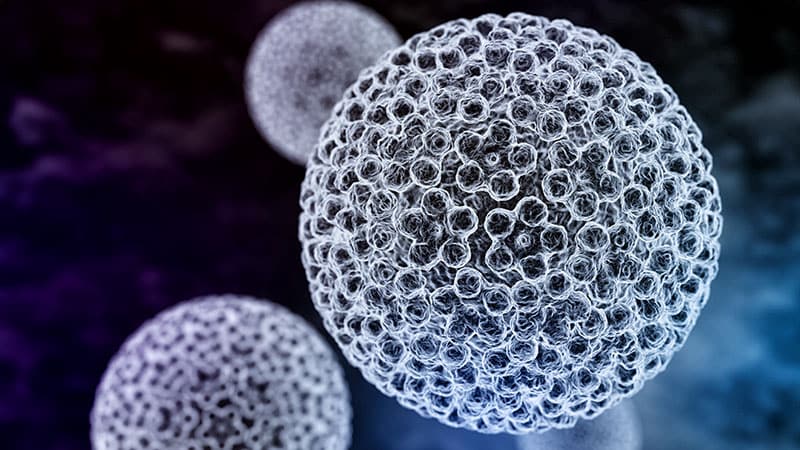Core Concepts
HPV vaccine Cervarix is highly effective in preventing cervical cancer in women vaccinated between ages 12 and 13 years.
Abstract
TOPLINE:
- Cervarix vaccine effective in preventing cervical cancer in women aged 12-13.
METHODOLOGY:
- Cervical cancer is the fourth most common cancer in women globally.
- Cervarix vaccination programs started in the UK in 2007.
- Data collected in 2020 from 447,845 women born between 1988-1996 in Scotland.
- Correlation between cervical cancer rates and vaccination status, age, and deprivation.
TAKEAWAY:
- No cervical cancer cases in women vaccinated at ages 12-13.
- Women vaccinated at 14-18 with three doses had lower cancer rates.
IN PRACTICE:
- Continued monitoring needed to assess vaccine changes and longevity of protection.
SOURCE:
- Study led by Timothy J. Palmer, PhD, Scottish Clinical Lead for Cervical Screening at Public Health Scotland.
LIMITATIONS:
- Only 14,645 women received one or two doses, affecting statistical analysis.
DISCLOSURES:
- Study funded by Public Health Scotland, with disclosures of attending advisory board meetings and research funding.
Customize Summary
Rewrite with AI
Generate Citations
Translate Source
To Another Language
Generate MindMap
from source content
Visit Source
www.medscape.com
HPV Vaccine Highly Effective in Girls Years Later
Stats
"No cases of cervical cancer were found among women who were immunized at ages 12 or 13 years, no matter how many doses they received."
"Women who were immunized between ages 14 and 18 years and received three doses had fewer instances of cervical cancer compared with unvaccinated women regardless of deprivation status (3.2 cases per 100,00 women vs 8.4 cases per 100,000)."
Quotes
"Continued participation in screening and monitoring of outcomes is required, however, to assess the effects of changes in vaccines used and dosage schedules since the start of vaccination in Scotland in 2008 and the longevity of protection the vaccines offer."
Key Insights Distilled From
by Brittany Var... at www.medscape.com 01-26-2024
https://www.medscape.com/viewarticle/hpv-vaccine-shown-be-highly-effective-girls-years-later-2024a10001wf
Deeper Inquiries
What are the potential implications of the study's findings on HPV vaccination programs globally
The study's findings on the effectiveness of the Cervarix vaccine in preventing cervical cancer among women vaccinated at ages 12 or 13 years could have significant implications for HPV vaccination programs globally. These results provide strong evidence supporting the importance of early vaccination, potentially influencing vaccination policies in other countries. Governments and health organizations may consider prioritizing HPV vaccination at younger ages to maximize the protective benefits of the vaccine and reduce the burden of cervical cancer in the long term. Additionally, the study underscores the importance of continued monitoring and evaluation of vaccination programs to assess their impact on cervical cancer rates and inform future public health strategies.
How might the limited number of women receiving one or two doses impact the overall conclusions drawn from the study
The limited number of women receiving one or two doses of the HPV vaccine in the study could impact the overall conclusions drawn from the research. With only 14,645 women falling into this category, the statistical analysis may be affected by the smaller sample size, potentially leading to less robust or generalizable results. The findings related to the efficacy of one or two doses of the vaccine may be less conclusive compared to those for women who received the recommended three doses. As a result, the study's conclusions regarding the effectiveness of different vaccination dosages may be less definitive for women who did not complete the full vaccination schedule.
How can advancements in HPV vaccines and dosage schedules further improve cervical cancer prevention strategies
Advancements in HPV vaccines and dosage schedules have the potential to further improve cervical cancer prevention strategies by enhancing vaccine efficacy, accessibility, and long-term protection. Research and development efforts focused on developing next-generation HPV vaccines with improved efficacy against a broader range of HPV strains could enhance the overall effectiveness of vaccination programs. Furthermore, optimizing dosage schedules to maximize immune response and duration of protection could lead to more efficient and cost-effective vaccination strategies. By incorporating advancements in vaccine technology and dosing regimens, public health authorities can strengthen cervical cancer prevention efforts and reduce the global burden of this disease.
0
